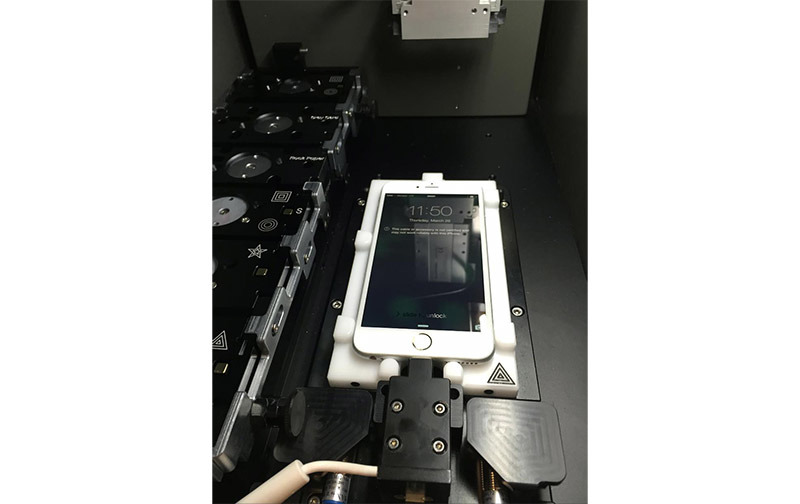An image of the special machine Apple uses to conduct back-of-store iPhone repairs surfaced online on Tuesday, with the photo showing off a few more features than previous leaks including an up-close look at screen calibration controls.
Apple's iPhone calibration machine. Click for larger.
Source: Motherboard
The picture was sent in to Motherboard after reporter Jason Koebler put a bounty out for information regarding Apple's "iPhone Calibration Machine," a specialized piece of equipment used by Geniuses and tech personnel to conduct device repairs.
AppleInsider can confirm the photo is legitimate and does depict an authorized iPhone screen repair machine, albeit an older version. Newer models are more self-contained and feature an industrial style casing to protect sensitive calibration equipment. Apple has an unknown number of variants in play at its brick-and-mortar stores, and while each machine performs the same or similar duties, their aesthetic appearance is widely varied.
The first photos of Apple's machine leaked out in 2013, shortly after the company began offering on-site iPhone 5 screen replacement services.
A former Genius told Motherboard how the machine works.
"It was a big clunky machine that honestly looked like someone built it in their backyard," the person said. "There were different 'moulds' that different iPhone models would go into before going in the machine, and it would take around 30 minutes ... there was some weird liquid that needed to be placed in the machine that we would have to wear gloves with to fix it. Lots of gas type valves and whatnot. It literally looked like some backyard home job. Not very Apple-like at all."
The square, circle, star and triangle chevrons to the left of the iPhone are used to calibrate the handset's camera, while the "gray card" and "flock paper" controls are for screen calibrations.
In addition to screen swaps and device calibration, the machine also allows technicians to replace iPhone's Touch ID home button. When connected to a Mac, the repair apparatus is able to validate a newly installed fingerprint sensor with an internal Apple server.
Third-party repair shops lack access to the special machine and are therefore unable to conduct certain screen repairs and Touch ID swaps. The latter limitation, instituted as a security measure, drew the ire of consumers and repair professionals last year.
In early 2015, a number of iPhone users reported so-called "Error 53" codes that would render their hardware unusable. Last year, it was learned that Error 53 messages are actually an iOS security measure triggered when an iPhone undergoes unauthorized Touch ID repairs. Customers later filed a class action lawsuit over the matter, but the case was quickly tossed for lack of standing.
Along with the security safeguards it provides, Apple's machine also ensures a consistent repair experience across its many stores. The process is under fire, however, as so-called "right to repair" bills threaten to force the company to make manuals, parts and presumably the specialized iPhone machine to consumers and third-party repair shops. Apple has lobbied against such state measures in the past and just last week sent a representative to argue its case in Nebraska.
 Mikey Campbell
Mikey Campbell







-m.jpg)






 Christine McKee
Christine McKee
 Malcolm Owen
Malcolm Owen

 Charles Martin
Charles Martin


 Mike Wuerthele
Mike Wuerthele


-m.jpg)






26 Comments
Question for the ‘right to repair’ supporters? Should Apple be forced to sell these machines, or lease them, to third party repair shops? Should the price or leases of these machines be regulated by the government so as to promote ‘fairness’?
Hopefully the employee who violated an NDA to sell these is swiftly punished.
This is one of the Apple superior technologies competitors try to steal with the help of the reporter paying a bounty.